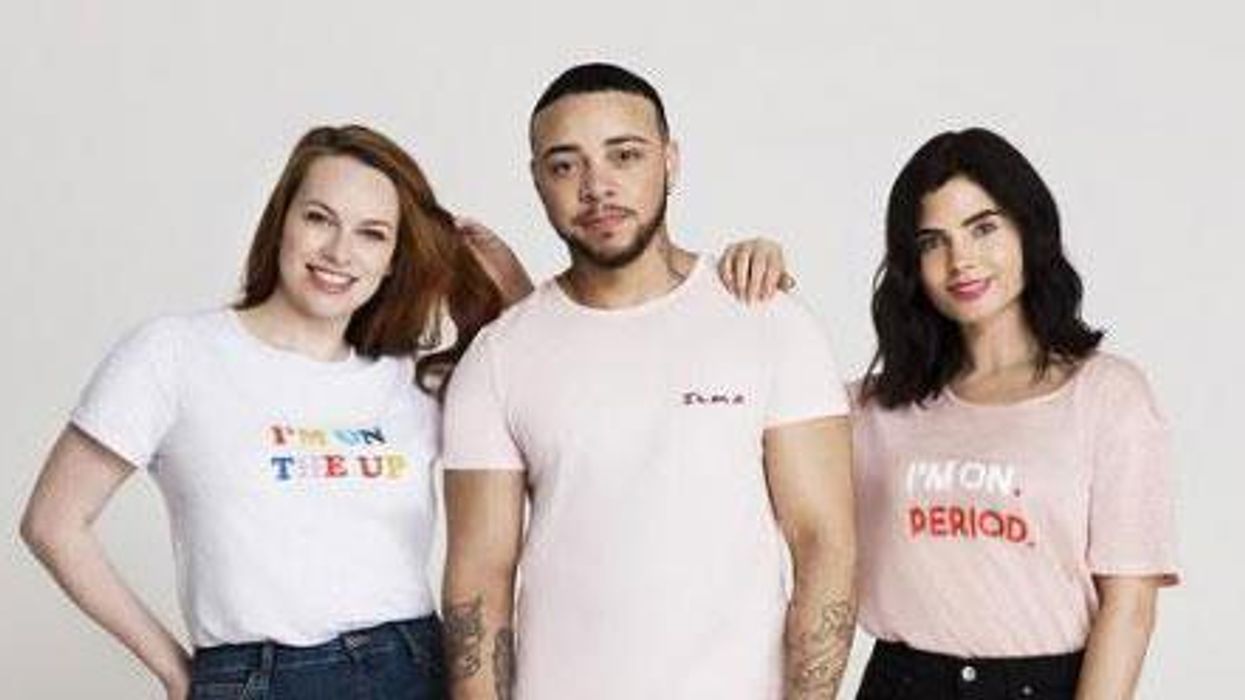News
Mimi Launder
Mar 22, 2018

Period poverty is not just a girl’s issue.
If stigma silences girls struggling with periods, try living life as a man with a period knocking on your womb once a month, demanding to be heard.
Kenny Jones, a 23-year-old transgender male model, suffered with periods while transitioning at a young age: he was 14 when he came out a transgender and 16 when he changed his name. He explained that he felt stripped of his identity whenever he was on his period:
You feel masculine, but you have this really feminine secret... It kind of felt like my body was fighting itself.
Feeling “boxed in” without anyone to speak to, Kenny would even avoid approaching his mum and sister for help in case they were scared to make him feel uncomfortable.
So, years later, when ‘I’m On’ – the new campaign led by UK-based tampon subscription service Pink Parcel – asked him to front their movement, it was an easy choice for Kenny despite the challenges it promised. He said:
Anything that's trying to be positive, trying to empower people, trying to break stereotypes, I'm 100% down to be a part of. That's kind of what I live for.
He joins high-profile women in the campaign, including British fashion designer Olivia Rubin, style influencer and activist Natalie Lee, and journalists and podcast hosts Pandora Sykes and Dolly Alderton.
Five pounds from the sale of each of the campaign's t-shirts will go to Bloody Good Period, a charity which donates menstrual products to asylum seekers and refugees in a bid to tackle period poverty.
The campaign has put Kenny face-to-face with the shocking ramifications of being poor with a period. Unable to afford sanitary products, two-fifths of girls have been forced to use toilet roll, according to a survey by girls’ rights charity Plan International UK. Seven per cent of girls even said they have used socks, other fabric, newspaper or paper to manage their period.
This is ‘period poverty’, the desperate situation nearly one in five women in Scotland have found themselves in – and, as many appear to forget or not even recognise, it is an issue that also affects men. Kenny said:
Sanitary items are not cheap...
It's sad to think that something that is a normal bodily function is not really supported and people have to go against what they think is hygienic, which is tough.
When he was transitioning, Kenny struggled to walk into a shop to buy sanitary products, attempting to either bring his mum or ordering them online instead.
It’s these small obstacles that are often overlooked by the rest of the population, he said – such as having to switch to briefs to accommodate pads and hiding sanitary products from girls visiting his house.
Though Kenny eventually came to see periods as nothing more than a bodily function, rather than as the ultimate expression of femininity, he was vulnerable and impressionable during his early days transitioning.
I didn't want to be recognised as a woman.
This is why Kenny thinks it is even harder for trans men living in period poverty to get the help they need.
Trans people are at a higher risk of homelessness, according to Action for Trans Health. Nearly one-third said they were living in poverty, about twice the rate of Americans worldwide, a National Centre for Transgender Equality survey revealed. Kenny made this worrying point:
If I was homeless four years ago, and I had to ask for period pads, I would rather do anything else. I wouldn't want someone else to judge me. Especially at that point, you're so impressionable early on in your transition because you're scared of what people think about you.
He continued:
It's sad enough for a cis woman to go without sanitary items when they can somewhat feel comfortable, I would say, and more able to ask for help – as opposed to having a trans man approaching you and you might just say 'no'.
I would have rather died than walk into a clinic to ask for this.
What do we still need to do?
Kenny thinks it should be easier for trans men to access sanitary products without having to walk into a clinic that screams ‘transgender’, outing you in the process. He said:
It's unfair. It's unfair because I wouldn't want that for anybody else. Everyone should feel comfortable with who they are.
More: Doctors have finally confirmed that periods are almost as painful as heart attacks
More: A woman who had to use toilet roll instead of sanitary towels on her mission to fight period poverty
Top 100
The Conversation (0)
x













